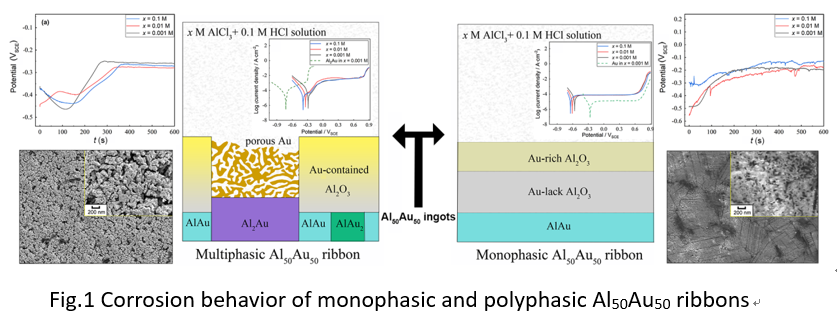Recently, Professor Bian Xiufang's group in the college of materials science and engineering had an important progress in corrosion behavior of Al-Au alloy which is published as "Corrosion behavior of monophasic and multiphasic Al50Au50ribbons in AlCl3 + HCl solution" in the top journal Corrosion Science(https://doi.org/10.1016/ j.corsci.2019.108398). Mr.Yan Zhicheng, a postgraduate student, is the first author in this paper. Professor Wang Weimin, with Shandong University, and professor Zhang Laichang,with Edith Cowan University, are corresponding authors of this paper, and Shandong University is the first corresponding university.
Due to its high specific surface area and low density, nano porous material has been widely used in the catalytic sensor and new electrochemical energy system. Among the numerous methods, adjusting the metallic precursor is the most effective method to tune the nano porous structure. In order to further understand the influence of precursor structure on the dealloying process, Prof. Wang Weimin tests to study the corrosion behavior and mechanism of moly- and polyphasic Al-Au alloys.
Under the guidance of Prof. Wang and Zhang, Mr. Yan prepared a single-phase AlAu alloy ribbon successfully, and found that the alloy consisting different phase compositions shows completely different corrosion behaviors. The corrosion products of the polyphasic alloy have a porous structure and will further accelerate the corrosion of matrix phase, which gives new insight to the synthesis of nanoporous gold. In addition, the single-phase AlAu has a special potential response in hydrochloric acid, which is explained from the band structure of the alloy surface passivation membrane.
In recent years, Prof. Bian Xiufang's group is deepening the international cooperation with the well-known universities like Edith Cowan University and so on, is doing the research works in the magnetic properties, corrosion resistance, wastewater degradation performance of amorphous alloys, and has obtained a series of progress published in Advanced Materials, Advanced Functional Materials, Corrosion Science, Electrochimica Acta,etc. The above research has been supported by the National Key Basic Research Development Program (2016YFB0300501) National Natural Science Foundation of China.
